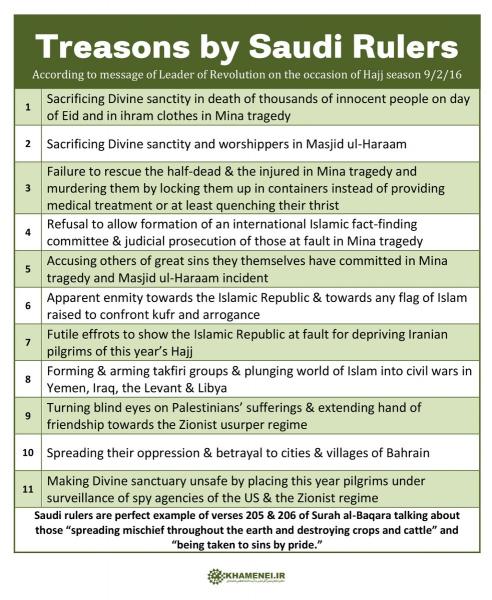The war of words is heating up between Iran and Saudi Arabia. They traded angry barbs before the annual hajj pilgrimage. On September 5, Iran’s supreme leader accused Riyadh of murdering its citizens one year ago. In September 2015, hundreds of Iranians were killed in a stampede during the ritual in Saudi Arabia. Nearly 2,500 people reportedly died in total. Tehran accused Riyadh of mismanagement and threatened legal action. Saudi officials accused Iran of playing politics in the aftermath of the tragedy.
“The heartless and murderous Saudis locked up the injured with the dead in containers- instead of providing medical treatment and helping them or at least quenching their thirst. They murdered them,” Supreme Leader Ayatollah Ali Khamenei charged on his website in September 2016. Khamenei’s office also tweeted 11 instances of “treason” by Saudi rulers, which included accusations about the Sunni kingdom’s foreign policies.
Hajj hijacked by oppressors,Muslims should reconsider management of Hajj https://t.co/17xsFAY8vt #alSaudHijacksHajj pic.twitter.com/nv39JnmQQ0
— Khamenei.ir (@khamenei_ir) September 5, 2016
In response, Saudi Arabia’s Crown Prince and Interior Minister Mohammed bin Nayef accused Iran of trying to “politicize” the hajj, according to comments published by the Saudi Press Agency. He claimed that Iran’s authorities were not interested in sending pilgrims this year, referring to failed negotiations in May over the hajj. Khamenei’s remarks reflect “a new low,” Abdulmohsen Alyas, the Saudi undersecretary for international communications and media at the Ministry of Culture and Information, told the Associated Press. “These accusations are not only unfounded, but also timed to only serve their unethical, failing propaganda,” he said.
Saudi Arabia’s top cleric, Grand Mufti Abdulaziz al Shiekh, entered the fray on September 6. He told Saudi media that Iran’s leaders are “not Muslims” and that Khamenei’s comments were “not surprising” because Iranians are descendants of “Majoos” —a derogatory term for followers of Zoroastrians and those who worship fire. Zoroastrianism, a monotheistic religion that predates Christianity and Islam, was the predominant faith in Persian before the Arab conquest in the seventh century. “Their enmity with Muslims is old, especially with Sunnis,” Sheikh told the Mecca daily newspaper.
Saudi Arabia's top cleric says Tehran’s leaders are "not Muslims,” intensifies row with Iran https://t.co/i5seITWA0k pic.twitter.com/QUs9tq9qmZ
— Yahoo News (@YahooNews) September 6, 2016
Iranian Foreign Minister Mohammad Javad Zarif accused Saudi clerics of preaching terror in a tweet:
Indeed; no resemblance between Islam of Iranians & most Muslims & bigoted extremism that Wahhabi top cleric & Saudi terror masters preach.
— Javad Zarif (@JZarif) September 6, 2016
Former commander of Iran’s Revolutionary Guards and presidential candidate Mohsen Rezaei called Saudi Arabia a stain on the Islamic world that should be wiped off the map.
On September 7, Iranian President Hassan Rouhani called on the Muslim world to “punish the government of Saudi Arabia in order to have a real hajj.” At a weekly cabinet meeting, he said that the Saudi government must be held accountable for last year’s incident. “Unfortunately, this government has even refrained from a verbal apology to Muslims and Muslim countries.”
Saudi Arabia and Iran have been rivals for more than three decades. In recent years, the two have clashed over regional conflicts, particularly in Syria and Yemen. The relationship soured even further in January 2016 though. Riyadh executed a prominent Shiite cleric who supported anti-government protest, prompting protests in predominantly Shiite Iran. Hundreds of people stormed the Saudi Embassy in Tehran and vandalized property. Saudi Arabia then cut relations with Iran.
Click here for a timeline of Iran-Saudi relations.

